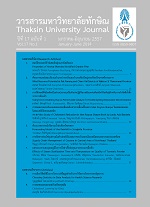An In-Vitro Study of Cholesterol Reduction in Man Rogosa Sharpe Broth by Lactic Acid Bacteria
Main Article Content
Abstract
Probiotics are live microorganisms, which when administered in adequate amounts can confer a health effect on host. The most widely used probiotic bacteria are lactic acid bacteria (LAB), consist of twenty genera such as Lactobacilli, Leuconostoc, Streptococci and Lactococci. LAB are normal components of the intestinal microflora in both human and animals and have been associated with various health-promoting properties. One beneficial effect that has been suggested to result from human consumption of LAB is a reduction in serum cholesterol levels, as suggested by the results of several human and animal studies. This study evaluated the use of LAB strains as a probiotic with potential hypocholesterolemic properties. Six species of LAB; Pediococcus pentosaceus 1 L14/1 (L14/1), P. acidilactici L25 (L25), Lactococcus lactic ssp. lactis 1 L 26 (L26), L. lactis C3 (C3), Lactobacillus plantarum TISTR 050 (Lp) and Enterococcus faecium N 15 (N15) were studied in terms of their abilities to reduce serum cholesterol as well as tolerate to acids and bile salts. The results showed that all tested LAB could grow in Man Rogosa Sharpe (MRS) broth at pH 4 with or without 0.3% oxgall bile. Although, they reduced the serum cholesterol, ranging from 27.21% to 44.45% in the broth system, but the level of reduction among the tested strains was not significantly different. In this study, all tested LAB were observed as cholesterol reducing agents, thus may be beneficial for reducing serum cholesterol levels. However, a concern on the strains of LAB to be used as hypocholesterolemic agents in human / animals should be considered. Further studies are needed to evaluate the mechanism of cholesterol reduction ability of these of LAB.


